American Evangelicals in Black and White
A recent article in the Atlantic about Southern Baptists, "White Christmas, Black Christmas" noted that "While the number of multiracial congregations has increased since the 1990s, 86 percent of congregations, representing eight in 10 attendees, remain overwhelmingly monoracial."Am I unfair to pick on churches, especially the Southern Baptists, for not integrating, back when schools were being forcibly integrated, with buses if necessary? After all, the neighbourhoods that were not forced to integrate - the ones in the North - didn't. Just about all American neighbourhoods and schools remain segregated, north and south, half a century after integration was supposedly the coming thing. Why pick on churches?
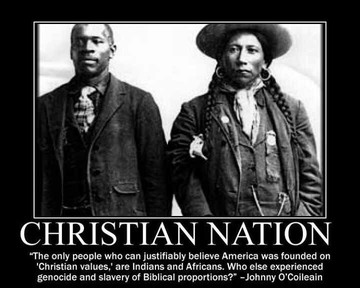 Many churches have a proud history of support for underdogs, for the poor, for human rights. Southern Baptists included! But, there is only a "Southern Baptist Convention" because of a break with the "American Baptist Convention" on the issue of slavery. One might imagine the whole notion of a separate Southern group in the 21st century would surely be wrong. They didn't rejoin other Baptists after the Emancipation? Not even in the 1960s, when civil rights became a widely-supported issue in which many Christian churches took the lead? Nope. I've never read an article where a journalist asked their leaders "why not?".
Many churches have a proud history of support for underdogs, for the poor, for human rights. Southern Baptists included! But, there is only a "Southern Baptist Convention" because of a break with the "American Baptist Convention" on the issue of slavery. One might imagine the whole notion of a separate Southern group in the 21st century would surely be wrong. They didn't rejoin other Baptists after the Emancipation? Not even in the 1960s, when civil rights became a widely-supported issue in which many Christian churches took the lead? Nope. I've never read an article where a journalist asked their leaders "why not?".
Why they remain separate is the main topic of Atlantic's "White Christmas, Black Christmas" article mentioned above: there are wider differences between those white and black Baptist church congregations than any in America. The white Baptists have the lowest level of belief (33%) among any whites, that black men are treated worse by the police; the black Baptists, the highest in America (82%).
That, for me, is the whole story. I suspect that the black Baptists would not be unwelcoming to white faces in their congregation; it's the other side that are nervous about black faces. I just googled now to check whether the infamous Roy Moore is specifically a Baptist. (Yes.) I found a letter to the L.A. Times, just hours old (November 19, 2017) Roy Moore has nothing to worry about:
After I turned 15, the preacher invited ministers from the "black churches" in the neighborhood to sit with him up there on the pulpit while he delivered a sermon on racial tolerance one Sunday. Shortly thereafter, the deacons held court in the church's basement and, with the preacher and his wife and children nearby, he was fired by the congregation.
I'm just going to say it: American evangelicals vote racist. You couldn't say that with certainty before Trump, because there were no more-openly racist Republican contenders for them to prefer over those still merely dog-whistling.
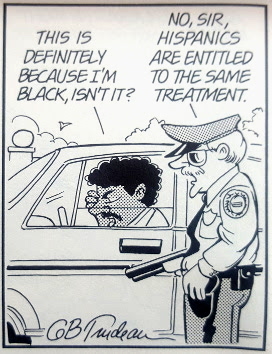 But Trump polled better among evangelicals in January 2016 better than Cruz and Rubio together(!) This poll came after the Trump speech with "Two Corinthians" in it. It's one thing to pick Trump over Clinton (if you're from that culture and regard her as a criminal monster), but quite another to pick the guy who said "Two Corinthians" over Marco Rubio, who could undoubtedly quote from II Corinthians, and Ted Cruz, who could probably recite it from memory (son of a pastor).
But Trump polled better among evangelicals in January 2016 better than Cruz and Rubio together(!) This poll came after the Trump speech with "Two Corinthians" in it. It's one thing to pick Trump over Clinton (if you're from that culture and regard her as a criminal monster), but quite another to pick the guy who said "Two Corinthians" over Marco Rubio, who could undoubtedly quote from II Corinthians, and Ted Cruz, who could probably recite it from memory (son of a pastor).
Articles about it just danced around the real issue, for my taste. They went on about minor differences in tone and policy; it was repeated that evangelicals have very strong policy concerns about abortion and gays and tough foreign policy. The problem is, you can't find a hair's-width of daylight between Trump and Cruz or Rubio on any standard Republican talking point; they're all against abortion and want tough foreign policy. The only really distinguishing feature is that Trump came out roaring about The Wall and Mexican rapists, whereas the other two candidates actually were Hispanic, and more moderate on immigration. I am unable to believe that evangelicals who preferred Trump did not mostly care about his views on race.
Journalists that specifically cover the "religous right", which can hardly be distinguished in practice from "white evangelicals", do focus on their racism, as with this 2014 story in Politico. The movement became political over segregation, not abortion. Jerry Falwell, the godfather of all things Religious Right, started off with a segregationist agenda, and both his faith-based university and other universities like it forbade their students inter-racial dates. It should actually be no more controversial to refer to white evangelicals as "pro-segregation" than "pro-life", since their position on it was always clear. The Sothern Baptist Fellowship did formally disavow segregation in 1995, but as recently as last year, a resolution for them to condemn white supremacy was hugely divisive. Journalists are truly enablers when they don't make this clear in every reference to white evangelicals. Indeed, they should never refer to "evangelicals" without clarifying whether they mean white, or evangelicals of colour - since the two are so dramatically different in a core belief.
In the end, white evangelicals gave Trump 80% of their election votes, compared to GW Bush getting 79%. Not much higher, but Bush was, personally, an evangelical; they actually liked Mr. Two Corinthians (and Three Wives) better than one of their own. Those sad about Mr. Trump's win could take some comfort that the tissue of sanctimony religious conservatives had always wrapped about them was surely proven false. They could care less about all of Mr. Trump's sexual bragging, his business frauds, his well-documented affairs that broke up the marriages. All those moral absolutes abruptly became relatively small compared to the imperative to keep out those Strangers.
My phrase "vote racist" was carefully chosen, because "vote" about a group is an inherently statistical term. Certainly, not every Southern Baptist or other evangelical is racist. But the statistics are damning. The really classic litmus test for racism is the old challenge, "Would you want your daughter to marry one?" When it gets down to that, you can also get statistics: Christianity Today quotes a Pew survey that shows while opposition to "miscegenation" has dropped from 75% of whites in 1968 to 7% in 2011. Except that 7% is from 16% among white evangelicals, and 6% for "all other" whites.
It was touching that the white and black pastors of the two adjacent Southern Baptist Churches in Macon, GA, were trying to get their congregations to enjoy a few social events together. But when you consider that having white and black ham radio clubs in Macon would be a national scandal, the very existence of monoracial churches, a half-century after "integration" was agreed to be necessary everywhere else, shows that they have a long way to go.
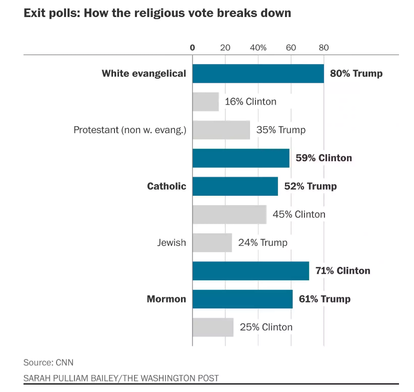 Evangelical support has been necessary to Republican victories since they chose a divorced Hollywood star over a Southern Baptist Sunday School teacher in 1980. The divorcee implemented Nixon's "Southern Strategy" of dog-whistle racism. But now, they are the core support of the wing of the GOP that frightens a solid majority of even that party. As I write, they remain the last supporters for Roy Moore, who frightened even Trump, the standard-bearer for that wing. That makes them the farthest outlier in the party, and obviously, the country. Their statistical presence at the racist fringe of the policing and miscegenation issues tends to confirm that.
Evangelical support has been necessary to Republican victories since they chose a divorced Hollywood star over a Southern Baptist Sunday School teacher in 1980. The divorcee implemented Nixon's "Southern Strategy" of dog-whistle racism. But now, they are the core support of the wing of the GOP that frightens a solid majority of even that party. As I write, they remain the last supporters for Roy Moore, who frightened even Trump, the standard-bearer for that wing. That makes them the farthest outlier in the party, and obviously, the country. Their statistical presence at the racist fringe of the policing and miscegenation issues tends to confirm that.
Courtesy of the Washington Post (if they kindly don't make me remove the graphic at left) we can look at how this is about the specific culture of this group, and not about religion. This is how they voted, according to exit polls. It's the source of the much-quoted stat that white evangelicals went 80% for Trump. What's fascinating is that all other Protestants, subtracting white evangelicals, were almost the reverse: 35% Trump, 59% Clinton. Catholics were closer to the American overall average, which of course was just over 50% Clinton: nearly three times as many Catholics liked Clinton as white evangelicals did, which undercuts the notion that opposition to abortion was the real evangelical motive.
Even the 61% of Mormons that voted Trump was distinctly lower than white evangelicals, though Mormons have dim views on abortion and strong ones on Israel. Heck, the Mormon church was openly racist until a few decades back, preventing blacks first from becoming members, then from becoming clergy. And white evangelicals beat even them at voting Trump.
For that matter, three religious groups shown in the survey are still openly sexist: women cannot become clergy in the Mormon church, the Catholic church, or in Judaism, which went 71% Clinton.
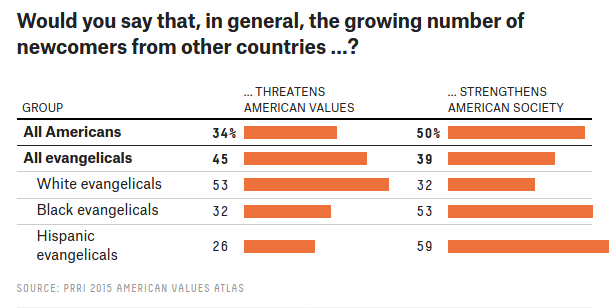 White evangelicals can say that they are simply acting out their religious beliefs when they vote, but this is contradicted not just by other Christian denominations, with sexist traditions and racist histories of their own, that now vote differently. The reason for these votes was clarified by a deeper dive survey that split out black, white, and Hispanic evangelicals.
White evangelicals can say that they are simply acting out their religious beliefs when they vote, but this is contradicted not just by other Christian denominations, with sexist traditions and racist histories of their own, that now vote differently. The reason for these votes was clarified by a deeper dive survey that split out black, white, and Hispanic evangelicals.
Note at left how opposite the black evangelicals are on this question from the whites: mirror-image numbers. Because of recent immigration issues, the Hispanic evangelicals are even further apart in opinion. About the only way for the whites to claim they are just voting their Christian beliefs would be to say that the black and Hispanic evangelicals are simply "bad Christians".
The media are very cowardly about pursuing interviewees on any religious matter. When white evangelicals offer their strict views on abortion as reason for voting for absolutely anybody - Trump, Moore, convicted criminals - they are never asked if this means that half of Catholics, 40% of Mormons, and over 50% of non-white evangelicals are all bad Christians with poor morals. At some point, the audience might realize that white evangelical Americans are actually a very small minority of all Christianity, the rest of whom can make their peace with abortion being legal in a nation, the fight against it to be entirely a spiritual affair: convincing women one at a time not to have one. When you think of the real divide between Church and State being the divide between spiritual actions - convincing minds to act righteously of their own free will - and temporal actions - forcing people to obey the State with physical force - it's odd that Christians ever chose the route of seeking temporal authority over women.
Only odd, perhaps, if you think that abortion was always their point. The artile in Politico noted above takes us right back to race and segregation again. It was never abortion. They differ from Catholics, Mormons and evangelicals of any colour but white strictly on the matter of race, which is not religious. It's cultural.
Claiming that your politics come from your religion is an old game, of course. A theory that hangs together better for me is that the evangelicalism, the racism, the militarism, and the authoritarianism are all a cluster of beliefs that mark a larger culture, a white culture.
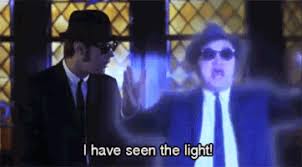 Recent politics have started to clearly identify white evangelicals with the "alt-right", that is, with the KKK and White Supremacy. What can I suggest to white American Evangelical Christians that are bothered by this association? Go to church. Go to a southern evangelical christian church. Except this time, make it a "black church". If enough of you go, there won't be any more "black churches" and "white churches", which has always been a shameful situation. Probably, not a lot more of your fellows will go. But, you, at least, might just See The Light.
Recent politics have started to clearly identify white evangelicals with the "alt-right", that is, with the KKK and White Supremacy. What can I suggest to white American Evangelical Christians that are bothered by this association? Go to church. Go to a southern evangelical christian church. Except this time, make it a "black church". If enough of you go, there won't be any more "black churches" and "white churches", which has always been a shameful situation. Probably, not a lot more of your fellows will go. But, you, at least, might just See The Light.
Text is COPYRIGHT, Roy Brander, 2020. All graphics are available Internet grabs that link to their source, and will be taken down upon request, to "roy.brander" at Google's mail system.
Postscript Added 2018/June/14: I rest my case
This article in the Washinton Post, June 13, 2018 offers a depressing story that confirms my opinions. While the news media emphasized the portion of the story about the local Baptist association, then the Southern Baptist Fellowship itself, expelling them, the only story for me is that the unconscious, widely-held attitudes of the congregation were such that they could not stand to be in the presence of their black neighbours even briefly:
[The black pastor sharing the church with the white congregation, coming after their service] alongside many in his congregation, would arrive early to their service with the hope of greeting white churchgoers as they left their morning service. Glass said Raleigh White objected to the encroachment and changed their service time to avoid the interaction.To be clear, they did not attempt to marry the white people's daughters, or even ask them to break bread together; they wanted to say "good morning" to them on the way into church. Even that was unacceptable!
The white evangelicals who felt that strongly about it so completely outnumbered those who did not mind shaking a black hand (if any), that there was no mention in the article of internal dissension in Raleigh White Baptist Church, just of conflict between them and the other congregation, and with the Baptist organizations.
Statistically, it isn't possible for the Southern Baptist Fellowship to have even one church where the congregation is like that unless racism of that remarkable degree is an overwhelming majority attitude.